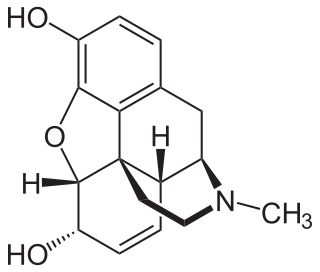Related Research Articles

Methadone, sold under the brand names Dolophine and Methadose among others, is a synthetic opioid agonist used for chronic pain and also for opioid dependence. It is used to treat chronic pain, and it is also used to treat addiction to heroin or other opioids. Prescribed for daily use, the medicine relieves cravings and removes withdrawal symptoms. Detoxification using methadone can be accomplished in less than a month, or it may be done gradually over as long as six months. While a single dose has a rapid effect, maximum effect can take up to five days of use. The pain-relieving effects last about six hours after a single dose. After long-term use, in people with normal liver function, effects last 8 to 36 hours. Methadone is usually taken by mouth and rarely by injection into a muscle or vein.

Opioid use disorder (OUD) is a substance use disorder characterized by cravings for opioids, continued use despite physical and/or psychological deterioration, increased tolerance with use, and withdrawal symptoms after discontinuing opioids. Opioid withdrawal symptoms include nausea, muscle aches, diarrhea, trouble sleeping, agitation, and a low mood. Addiction and dependence are important components of OUD.

Buprenorphine is an opioid used to treat opioid use disorder, acute pain, and chronic pain. It can be used under the tongue (sublingual), in the cheek (buccal), by injection, as a skin patch (transdermal), or as an implant. For opioid use disorder, it is typically started when withdrawal symptoms have begun and for the first two days of treatment under direct observation of a health-care provider. In the United States, the combination formulation of buprenorphine/naloxone (Suboxone) is usually prescribed to discourage misuse by injection. Maximum pain relief is generally within an hour with effects up to 24 hours. Buprenorphine affects different types of opioid receptors in different ways. Depending on the type of receptor, it may be an agonist, partial agonist, or antagonist. In the treatment of opioid use disorder buprenorphine is an agonist/antagonist, meaning that it relieves withdrawal symptoms from other opioids and induces some euphoria, but also blocks the ability for many other opioids, including heroin, to cause an effect. Unlike full agonists like heroin or methadone, buprenorphine has a ceiling effect, such that taking more medicine will not increase the effects of the drug.

Sally L. Satel is an American psychiatrist based in Washington, D.C. She is a lecturer at Yale University School of Medicine, a visiting professor of psychiatry at Columbia University, a senior fellow at the American Enterprise Institute, and an author.
Abdol Hamid Ghodse CBE was an academic in the field of substance abuse and addiction.

An opioid overdose is toxicity due to excessive consumption of opioids, such as morphine, codeine, heroin, fentanyl, tramadol, and methadone. This preventable pathology can be fatal if it leads to respiratory depression, a lethal condition that can cause hypoxia from slow and shallow breathing. Other symptoms include small pupils, and unconsciousness, however its onset can depend on the method of ingestion, the dosage and individual risk factors. Although there were over 110,000 deaths in 2017 due to opioids, individuals who survived also faced adverse complications, including permanent brain damage.
Herbert David Kleber was an American psychiatrist and substance abuse researcher. His career, centered on the evidence-based treatment of addiction, focused on scientific approaches in place of punishment and moralisms. His career focused on pathology of addiction to help patients reduce the severe discomforts of withdrawal, avoid relapse and stay in recovery.

Substance use disorder (SUD) is the persistent use of drugs despite substantial harm and adverse consequences as a result of their use. Substance use disorders are characterized by an array of mental/emotional, physical, and behavioral problems such as chronic guilt; an inability to reduce or stop consuming the substance(s) despite repeated attempts; operating vehicles while intoxicated; and physiological withdrawal symptoms. Drug classes that are commonly involved in SUD include: alcohol (alcoholism); cannabis; opioids; stimulants such as nicotine, cocaine and amphetamines; benzodiazepines; barbiturates; and other or unknown substances.

Mark S. Gold is an American physician, professor, author, and researcher on the effects of opioids, cocaine, tobacco, and other drugs as well as food on the brain and behavior. He is married to Janice Finn Gold.

Charles P. O'Brien is a research scientist, medical educator and a leading expert in the science and treatment of addiction. He is board certified in neurology, psychiatry and addiction psychiatry. He is currently the Kenneth E. Appel Professor of Psychiatry, and vice chair of psychiatry, in the Perelman School of Medicine at the University of Pennsylvania.
The American Academy for Addiction Psychiatry (AAAP) is a professional organization and an accredited Continuing Medical Education (CME) provider, based in East Providence, Rhode Island, USA. Its members are specialists in addiction psychiatry and other health care professionals who treat patients with addictions. AAAP provides medical education programs in the field of addiction psychiatry.

In the United States, the opioid epidemic is an extensive ongoing overuse of opioid medications, both from medical prescriptions and from illegal sources. The epidemic began in the United States in the late 1990s, according to the Centers for Disease Control and Prevention (CDC), when opioids were increasingly prescribed for pain management and resulted in a rise in overall opioid use throughout subsequent years. The great majority of Americans who use prescription opioids do not believe that they are misusing them.
Ellen Rose Meara is a professor at The Dartmouth Institute for Health Policy and Clinical Practice, part of Dartmouth College in New Hampshire, United States. Her research is in the fields of health economics and health policy. She is also a faculty research fellow at the National Bureau of Economic Research and an adjunct professor in economics at Dartmouth College.

Keith Humphreys is an American psychologist currently the Esther Ting Memorial Professor at Stanford University, a Senior Research Career Scientist in the Veterans Health Administration, and an Honorary Professor at the Institute of Psychiatry, King's College, London. His scholarship has focused on addiction, veterans' health, self-help groups for chronic diseases, electronically delivered mental health treatments, and the extent to which samples in treatment research differ from real-world patients in everyday clinical practice. He has published over 350 peer-reviewed articles and his work has been cited over 18,000 times. He is The Deputy Editor in Chief for the journal Addiction. Humphreys won the 2021 Under Secretary's Award for Outstanding Achievement in Health Services Research from the U.S. Department of Veterans Affairs.

The opioid epidemic, also referred to as the opioid crisis, is the rapid increase in the overuse, misuse/abuse, and overdose deaths attributed either in part or in whole to the class of drugs opiates/opioids since the 1990s. It includes the significant medical, social, psychological, and economic consequences of the medical, non-medical, and recreational abuse of these medications.
Hendrée E. Jones is a researcher on women's substance abuse disorders and its impact on children. She is a professor in the Department of Obstetrics and Gynecology at the University of North Carolina School of Medicine, and adjunct professor in the University of North Carolina College of Arts & Sciences Department of Psychology and Neuroscience. Jones is the executive director of the UNC Horizons Program, which is a comprehensive drug treatment program for mothers and their drug-exposed children. She is a consultant for the Substance Abuse and Mental Health Services Administration, the United Nations, and the World Health Organization.
Kelly J. Clark is an American physician and psychiatrist known for her work in the fields of substance use disorder, addiction medicine, and addiction psychiatry.

Prescription drug addiction is the chronic, repeated use of a prescription drug in ways other than prescribed for, including using someone else’s prescription. A prescription drug is a pharmaceutical drug that may not be dispensed without a legal medical prescription. Drugs in this category are supervised due to their potential for misuse and Substance use disorder. The classes of medications most commonly abused are opioids, central nervous system (CNS) depressants and central nervous stimulants. In particular, prescription opioid is most commonly abused in the form of prescription analgesics.
John F. Kelly is an American-based researcher and professor of addiction medicine at Harvard Medical School. He is the Founder and Director of the Massachusetts General Hospital Recovery Research Institute, Associate Director of the MGH Center for Addiction Medicine, and Program Director of the MGH Addiction Recovery Management Service.

Mindfulness-Oriented Recovery Enhancement (MORE) is an evidence-based mind-body therapy program developed by Eric Garland. It is a therapeutic approach grounded in affective neuroscience that combines mindfulness training with reappraisal and savoring skills. Garland developed this approach by combining the key features of mindfulness training, "Third Wave" cognitive-behavioral therapy, and principles from positive psychology.
References
- ↑ "The Philadelphia Business Journal's annual program honors 30 women who are making their mark in business in the Greater Philadelphia region". Philadelphia Business Journal . Retrieved 14 March 2021.
- ↑ Kloc, Joe (11 February 2014). "Flappy Bird Creator Says His Game Was Too Addictive". Newsweek . Retrieved 14 March 2021.
- ↑ Chiu, Allyson. "What was lost when covid forced addiction support groups online – and what was gained". The Washington Post . Retrieved 14 March 2021.
- ↑ "CARE Advisor Deni Carise to Speak at NCAD on Our 'New Normal'". Psychiatry & Behavioral Health Learning Network. Retrieved 14 March 2021.
- ↑ "CRC Health Group Appoints Deni Carise, Ph.D., to Deputy Chief Clinical Officer | thedailyreview.org.uk". www.thedailyreview.org.uk.
- ↑ "Speaker Details: The Mental Health and Addiction Symposium & Heroes for Recovery Luncheon". mhai.swoogo.com.
- ↑ "Deni Carise, Ph.D., Chief Scientific Officer, RCA, Adjunct Assistant Professor, University of Pennsylvania". Cornerstone For Hope.
- ↑ McKay, James R.; Carise, Deni (2009). "Second Betty Ford Institute Conference: Extending the Benefits of Addiction Treatment: Practical Strategies for Continuing Care and Recovery". Journal of Substance Abuse Treatment. 36 (2): 172–173. doi:10.1016/j.jsat.2008.10.007. ISSN 0740-5472. PMC 2748678 . PMID 19161897.
- ↑ "Opioid Special Chat Transcript". 6abc Philadelphia. 24 January 2018.
- ↑ Chiu, Allyson. "What was lost when covid forced addiction support groups online – and what was gained". Washington Post.
- ↑ "AFI_Catalog - The Wolf of Wall Street". catalog.afi.com.
- ↑ "Carise: Don't Refer To Opioid Abusers As Addicts". wbal.com.
- ↑ Smith, Bridget (1 October 2020). "How Real Survivors of the Opioid Crisis Brought Sno Babies to Life". MovieMaker Magazine.
- ↑ "US: Part 2 of 3 - Nightline: Getting Straight". www.mapinc.org.
- ↑ "New details about Houston's death emerge". MSNBC.com.
- ↑ Persons, Sally (20 May 2020). "As coronavirus rages on, the opioid epidemic does too". Fox News.
- ↑ "Opioid Special Chat Transcript". 6abc Philadelphia. 23 January 2018.
- ↑ "Expert Offers Tips On How To Help Someone Struggling With Prescription Drug Addiction". 14 January 2012. Retrieved 16 March 2021.
- ↑ "Jim Carrey lawsuit shines light on prescription drug addiction in U.S." NBC News.
- ↑ "Deni Carise". scholar.google.com. Retrieved 16 March 2021.